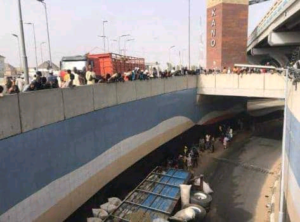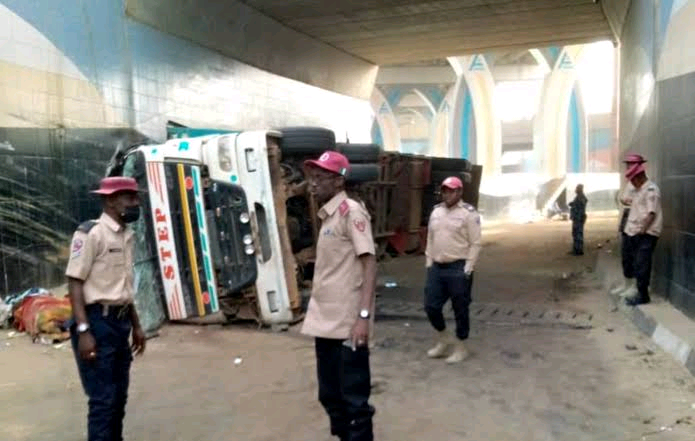…“We Watched Them Die Helplessly,” as Overloaded Trailer Kills 23 of Our Family Members
In the heart of Kano, beneath the towering structure of the Muhammadu Buhari Interchange Flyover, a devastating tragedy unfolded on the night of February 13, 2025.
A trailer, heavily laden with goods and passengers, lost control and overturned, leading to a catastrophic accident that claimed the lives of 23 individuals and left 48 others injured.
This incident has not only cast a somber shadow over the city but has also ignited a profound reflection on road safety and the sanctity of human life. Hussaini Kafi in Kano speaks with bereaved families, survivors.

The Fateful Night
At approximately 9:50 p.m., the bustling city of Kano was winding down when the tranquility was shattered by the harrowing sounds of metal crashing and anguished cries.
Eyewitnesses recount a scene of chaos as the trailer, a DAF model, veered out of control due to excessive speed.
The vehicle, unable to navigate the curve beneath the flyover, overturned, spilling its human and material cargo onto the asphalt.
The Federal Road Safety Corps (FRSC) swiftly responded to the distress call.
Their preliminary investigations revealed that the driver’s reckless speeding was the primary cause of the accident.
The trailer, designed primarily for goods, was perilously overloaded with passengers, a common yet hazardous practice in the region.
A City in Mourning
The aftermath of the accident was a tableau of grief and despair. Families rushed to the scene and local hospitals, desperate for news of their loved ones.
The Murtala Muhammed Specialist Hospital became a focal point of sorrow, as the injured were ferried in for urgent medical attention. Medical personnel, already stretched thin, worked tirelessly to tend to the wounded, their efforts a testament to their unwavering commitment amidst overwhelming circumstances.
Kano State Governor Abba Kabir Yusuf addressed the public, expressing deep sorrow over the tragedy and assuring citizens of the government’s commitment to improving road safety measures. In his statement, the governor called on transporters to adhere strictly to road regulations to prevent further loss of life.
Voices from the Wreckage
Survivors of the accident recounted their experiences with a mixture of shock and sorrow. Amina Yusuf, a trader who was aboard the ill-fated trailer, described the moments leading up to the crash:
“We were traveling as usual, the trailer filled with goods and people. Suddenly, I felt a jolt, and before I knew it, we were tumbling. I lost consciousness and woke up in the hospital. I still can’t find my sister who was with me.”
Another survivor, Ibrahim Musa, a father of three, spoke through tears:
“I was returning home to my family. Now, I don’t know if I’ll ever see them again. The pain is unbearable, not just physically but in my heart.”
Residents who witnessed the scene struggled to hold back their emotions. Abdullahi Umar, a shop owner near the flyover, recalled:
“We watched them die helplessly. Some people were crying out for help, but there was nothing we could do. The sight of bodies lying on the road is something I will never forget.”
A motorcyclist, Malam Sani, who was nearby when the crash happened, added:
“I heard the loud bang and rushed there. I saw people under the trailer, trapped, screaming. It was a nightmare. We tried to lift the trailer, but it was too heavy. We felt powerless.”
A Call for Change
This tragic event has sparked a broader conversation about road safety and transportation practices in Nigeria. The FRSC has reiterated the dangers of overloading vehicles and the imperative need for drivers to adhere to speed limits. Umar Matazu, the Sector Commander of the FRSC in Kano, emphasized:
“This accident is a stark reminder of the consequences of reckless driving and overloading. We must enforce stricter regulations and ensure that drivers are educated on the importance of road safety.”
Community leaders and activists have also voiced their concerns. Hauwa Ibrahim, a local advocate for road safety, stated:
“How many more lives must we lose before we take decisive action? Our roads have become death traps, not because of their condition, but because of our negligence and disregard for safety.”
A Public Health Crisis
Road traffic accidents (RTAs) in Nigeria have escalated into a significant public health crisis. According to a study published in the Annals of Medical and Health Sciences Research, RTAs are the third-leading cause of overall deaths in the country, the leading cause of trauma-related deaths, and the most common cause of disability. The study emphasizes the multifactorial causes of these accidents, including driver behavior, vehicle conditions, and roadway maintenance.
The Nigerian Red Cross Society has raised alarms over the staggering road accident rates, revealing that the country accounts for nearly 200,000 of the two million annual road traffic deaths worldwide. This statistic underscores the urgent need for comprehensive road safety measures and public awareness campaigns to curb the escalating fatalities.
Emergency Response Challenges
The immediate response to such accidents is crucial in saving lives. However, Nigeria’s emergency medical services face numerous challenges. A 2019 survey by Emergency Response Africa (ERA) highlighted that three out of four Nigerians had experienced at least one medical emergency in the past five years, with over a quarter experiencing more than four. The survey also revealed that medical conditions and road traffic accidents significantly contributed to these emergencies.
Despite the high incidence of emergencies, the country grapples with inadequate emergency preparedness and response infrastructure. The World Health Organization (WHO) has been working to strengthen the health emergency workforce in the African region through initiatives like the Strengthening and Utilizing Response Groups for Emergencies (SURGE).
These efforts aim to develop the capacity of member states, including Nigeria, to respond effectively to emergencies by investing in their emergency workforce.
A Nation Reflects
As the nation grapples with the enormity of this loss, there is a collective introspection on the value placed on human life and the measures necessary to protect it. The Muhammadu Buhari Interchange Flyover, once a symbol of progress and connectivity, now stands as a poignant reminder of the lives lost and the urgent need for change.
In the days following the accident, communities gathered to mourn, pray, and support one another. The air was thick with grief, but also with a resolute determination to prevent such tragedies in the future.
The Road Ahead
Preventing future incidents requires a multifaceted approach. Stricter enforcement of traffic regulations, regular vehicle maintenance checks, and public awareness campaigns are essential steps. The government has pledged to collaborate with transport unions, community leaders, and law enforcement agencies to develop and implement strategies aimed at enhancing road safety.
For the families affected by this tragedy, the road to healing is long and arduous. Counseling services and support groups have been established to provide emotional and psychological assistance.



